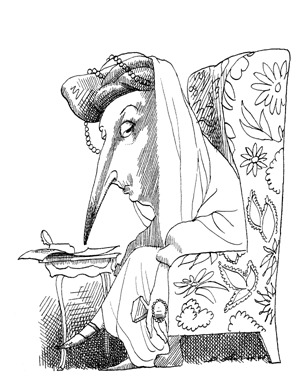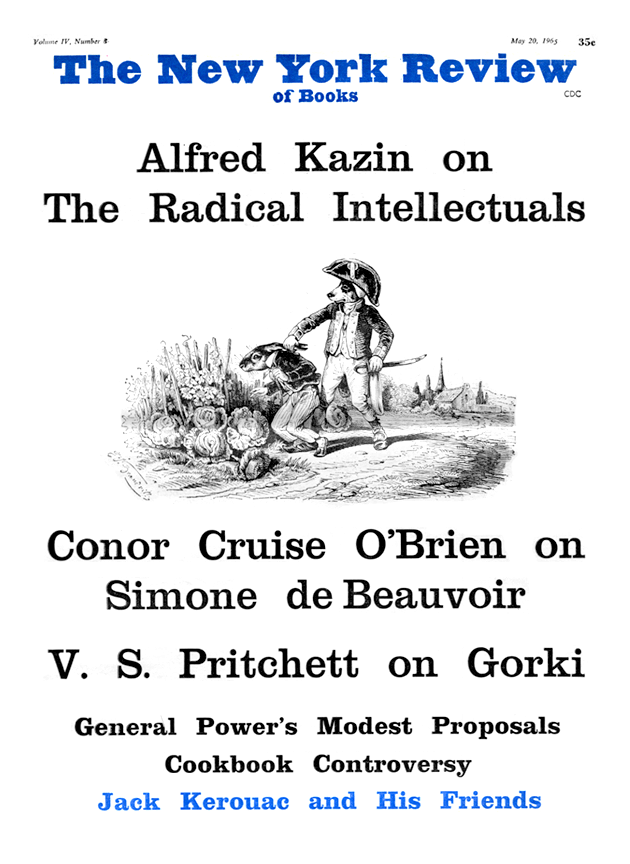How are we to explain or explain away (since it is going to need some explaining away for our posterity) the eminence or the acceptance or the at times reverential praise of the poems of the late Edith Sitwell? The poems will fall apart. They strike me, when I look at them again, as a tumble of imitation reliquaries. Of her early poems—the reliquaries are the later ones—some had the tinkliness of a broken music-box, some exhibited the arch simple-mindedness, not always pleasant-mindedness, of a neo-Victorian bouquet of wax and silk under the jags of a dome. Then the war, the bombs, the Great Bomb, and the reliquaries, inside of which there might—or might not—be the scraps of some body of holiness.
I was skeptical when these earnest poems began to appear and to be praised. The psalm sounded—O praise Miss Sitwell in the holiness of her pity and imaginative insight—and swelled; and even old skeptics were converted. But not this skeptic, who looked inside, and found precisely the nothing he expected to find, on past form. It was—I shall vary the exposition and call upon St. Adelbert of Prague and the luminescent fish once caught in the Danube—a fishy to-do. When that saint had been dismembered, it happened that his little finger fell or was thrown into the river: the fish swallowed the finger, the finger shone through the fish. But out of these Sitwellian reliquaries there shone, at any rate to my critical sense, no interior light even of that coldest luminescent kind. Crosses were inscribed or carved on the lid, inside there was not even the little finger of St. Adelbert.
As before, as so often in the Middle Ages, the best thing about these reliquary poems—“golden” having been Miss Sitwell’s key word—was their externality of gold leaf, or tinsel. All the light, all the sparkle came from outside, and reflected from the gilt, had its source in simpletons, sophisticated and unsophisticated, English and American, who were still in need of relics to worship; which is part of the explanation of Miss Sitwell. And another part, confirmed by this miserable autobiography, is that Miss Sitwell was one of her own most servile adulators.
She relates, to begin with, that she had a most unhappy childhood; which is no doubt true. If she is to be believed, her father and her mother alike were true scions of English aristocracy at its most vacuous, ignorant, insolent, and vulgar, which—such has been our aristocracy’s frequent eminence in these faults—is not saying a little. England’s aristocrats have scarcely been the makers or safekeepers of English civilization. “My parents were strangers to me from the moment of my birth.” Just as well, from the way she describes them. She needed to be straightened in an iron frame. She was ugly. She was bullied, she was violent, and she was lonely. “Au matin j’avais le regard,” she quotes from Rimbaud’s Une Saison en Enfer, “si perdu et la contenance si morte, que ceux que j’ai rencontrés ne m’ont peut-être pas vu.”
One might sympathize rather more, if the consequent and compensating vanity, the unbelievable self-adulation was not reflected backwards on to the account. “Perhaps I, at four years old, knew the incipient anguish of the poet I was to become.” Arthur Rimbaud “in some ways my closest spiritual relation.” “Fields of yellow jonquils that, in my later life, were like the spirits of my early poetry.” “‘What are you going to be when you are grown-up, little E?’…’A genius,’ I replied”—which is thrown to the adulating reader with the unexpressed because unnecessary assurance that a genius she became. Her first love was a peacock, her second an owl, she writes; and there are two ways of interpreting either bird.
One might sympathize rather more if the adult who grew into her “Plantagenet features” contrived to replace hatred with charity, if contumelious insults were not flung back as well into the past years, at her parents, at her relations, at the servants, at the doctors, at her teachers. “He looked like a statuette constructed of margarine” (orthopedic surgeon). “An alleged beauty…The upper part of her body consisted of an enormous pink ham which served her as face” (friend of her mama’s). “Endowed with a treble ration of shining protuberant teeth…always bared ingratiatingly” (the kindly maiden lady who tried to teach her to paint).
One might respect her more if the frenetic insults were not, page after page, thrown around as well as backward, if a self-extrication or transformation were visible such as Coleridge detected in Wordsworth, who out of a black nature made himself a deservedly happy man because he had learnt “the intrinsic value of the different objects of human pursuit.” Everything returns to the egoistic measure. As when she was young, as when she was middle-aged, so in old age every response was conditioned by the beginning. She met at one time D. H. Lawrence and Frieda Lawrence, who evidently presumed neither to like her nor to admire her. How appallingly coarse, insolent, and arrogant the deferred revenge! Lawrence looked “like a plaster gnome on a stone toadstool in some suburban garden.” How dared he be so beastly to Sir Clifford Chatterley—himself (during the First World War) having remained “safely at home, fornicating and squealing, shrilly, about the oppression from which he had suffered.” How appallingly and savagely she replies, thinking it worth printing the reply, to a slightly cuckoo if unsolicited letter from a harmless unknown!
Advertisement
Nastiness combines with triviality as one characteristic of this book, unameliorated by “success.” “Were I not too kind to laugh at the cruel disappointment and envy suffered by certain poor little unsuccessful writers”—poets forty years younger than herself who wrote of her poems without enthusiasm—“I might be amused by the fact that although I am now seventy-seven years of age, the unsuccessful are still thrown into what is practically an epileptic fit brought on by envy and malice at the mere mention of my name.”
“Were I not too kind…” In England it is now customary to say, Ah but Edith was so kind in private life. One’s concern is with her public life, the writing she exhibits; and in this book this writer, exclaiming because some people had abused her friend the poet Roy Campbell for “his verbal savagery about the Spanish Reds,” urges that they did not know what those Reds had threatened to do to his wife and children (“Roy did not appreciate these threats. Some people are most unreasonable!”) only a very few sentences after she had in effect praised this same Roy Campbell—for what? For threatening a Cambridge don (I suppose F. R. Leavis) with assault: “I’ll walk into your College and tear the clothes off your back, and by the time I’ve done with you your wife and children won’t know you.” The cause of this physical threat: critical disapprobation of Miss Sitwell’s poems. Such was her taste for vicarious violence where she was offended.
Add to the charges which condemn this book, sneering, malice, megalomania, arrogance and the rest, a very considerable stupidity, already apparent in some of the scraps I have quoted; and to stupidity, what is, after all, the most obvious characteristic of this writer: she was in everything she wrote an amateur, a poseur of art. Frequently she has to break off (can this life have been so meager?) to instruct her servile readers in the virtues, not of poetry, but of her poetry, servile once more to herself. A poem is quoted. A poem is explained, once more, as so often in her previous work, in the familiar jejune chatter of the texture of her vowels, consonants and vocables. That “the words ending in the letter D are placed so close together makes, in this particular case, a slight leap into the air.”
Though head is immediately linked up again in the next line with egg, yet because it had no previous related sound, there is no effect on rhythm.
Comparing her experience “during the first inception and creation of a poem…with all humility…to the experience of the saint,” this amateur poet thought that she must break now and then into writing her account of herself poetically. Now Dame Blake, now Dame Traherne, and now Dame Rimbaud, she proffers a sneezing parody of their vision—“In these countrysides, the people know that Destiny is reported, and has features like a hen. There have I seen pig-snouted darkness grunting and rooting in the hovels. The very clouds are like creaking wooden chalets filled with emptiness,” etcetera, in a general air of cheap and frigid untruth. The senses were weak and invented lies, like a child (simple ones, too—the hands of Wyndham Lewis were not “thick” and “meat colored” but of a singular delicacy. Dylan had no “look of archangelic power,” or of William Blake).
There are quotations in this book. Excluding quotations from herself, they are the best of it—though often used to indicate a parity between quoter and quoted. The aptest one, included for the differently megalomaniac purpose of ridiculing the idea that her genius, the genius of the tumbled reliquaries, could be ridiculed, she took unwisely from the poet D. J. Enright. “Writers who detach tragedy from the persons who suffer it,” Mr. Enright declared in the New Statesman, “are generally to be seen soon after wearing someone else’s bleeding heart on their own safe sleeve—an odious transaction and an odious transaction is what Dame Edith Sitwell’s atomic poetry seems to me to be.” And to me. But that was a condemnation too subtle and complete for this (poetically and publicly) impossible person to have understood. Yet in the end the disgrace lies more upon her febrile and snobbish supporters than on herself.
Advertisement
This Issue
May 20, 1965



